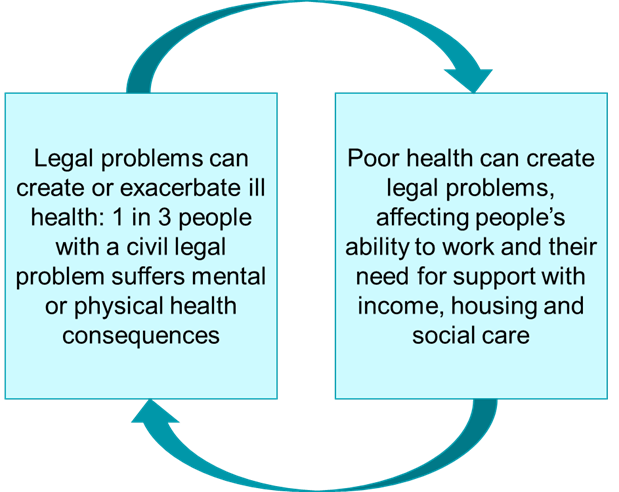Every Day Legal Problems
The law provides citizens with rights and entitlements, which aim to protect people from destitution, guarantee minimum standards for living and working conditions, and ensure access to essential services.
Legal problems are very common and often not thought of as being legal: simply practical problems of everyday life. They often relate to social welfare issues, for example problems with welfare benefits, debt, housing, employment, education, community care and immigration.
When people cannot secure their legal rights, this can lead to adverse life circumstances. For example, homelessness, poor quality and unstable housing, financial hardship due to debt and welfare benefits problems, exclusion from education and employment, and lack of access to public services and support.
Everyday legal issues are the problems of vulnerable people; those without wealth or power. They disproportionately affect people on low incomes, people with longstanding illness and disability, and people experiencing disadvantage and social exclusion. Social welfare legal issues can be very complex and vulnerable people may experience several at the same time.
Links between Legal Problems and Health
Law is arguably one of the most important social determinants of health, shaping the daily lives of individuals and populations. It influences peoples access to resources and support (including income, housing, employment and education), which in turn affects the chances of a long and healthy life.
If legal problems are not resolved, they can have negative impacts on health. They cause significant distress and can strongly affect mental wellbeing. Anxiety and depression are commonly reported, and more acute consequences include self-harm and suicidal behaviour. Legal problems can also affect physical health due to poor living and working conditions. For example, poor quality housing and homelessness increase the risk of respiratory problems, infectious diseases, health-harming behaviours, and poorer learning and development outcomes among children.
Poor health can cause legal problems to develop. Long-term conditions, disabilities and mental health issues can affect people’s ability to work, with consequences for employment, income levels and housing stability. Poor health can also increase the cost of living and create needs for support with education, employment, housing and social care. In these circumstances, people must access the services and support they are entitled to by law, to reduce the risk of problems escalating and multiplying.

The Role of Legal Assitance
Disadvantaged and vulnerable people may not secure the benefits and services they are entitled to by law. Many are not aware of their rights or cannot manage the complex application processes.
Welfare rights advice services can help people to secure their legal entitlements, improving personal resources and daily living conditions. This is a powerful and effective way to tackle the social determinants of poor health and inequality, and improve access to justice for vulnerable groups.
It is important that advice services are made available in a timely and accessible way to reach vulnerable people. Providing outreach into community settings, including healthcare services, can improve access at a time of need.
 Close
Close

